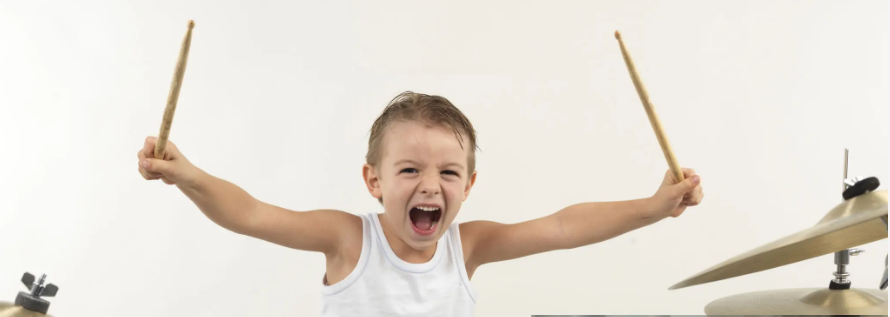

So you’ve got a keen young potential drummer in the house – and they’re badgering you to get a drum kit. And you’ve looked at electronic v acoustic (see our article on this here) and decided that an Acoustic or ‘real’ drum kit is the way to go – good call!
So you’ve done a web search for beginner drum kits and you are presented with hundreds of different options, of all different prices and you’ve no idea whether they really include everything that you need, and what the differences are – is it worth paying a bit more? Why are some which are well known so much cheaper than others? And what are the good brands to go for? Reading this should help pick your way through what’s needed.
“What are all the parts of a drum kit?”
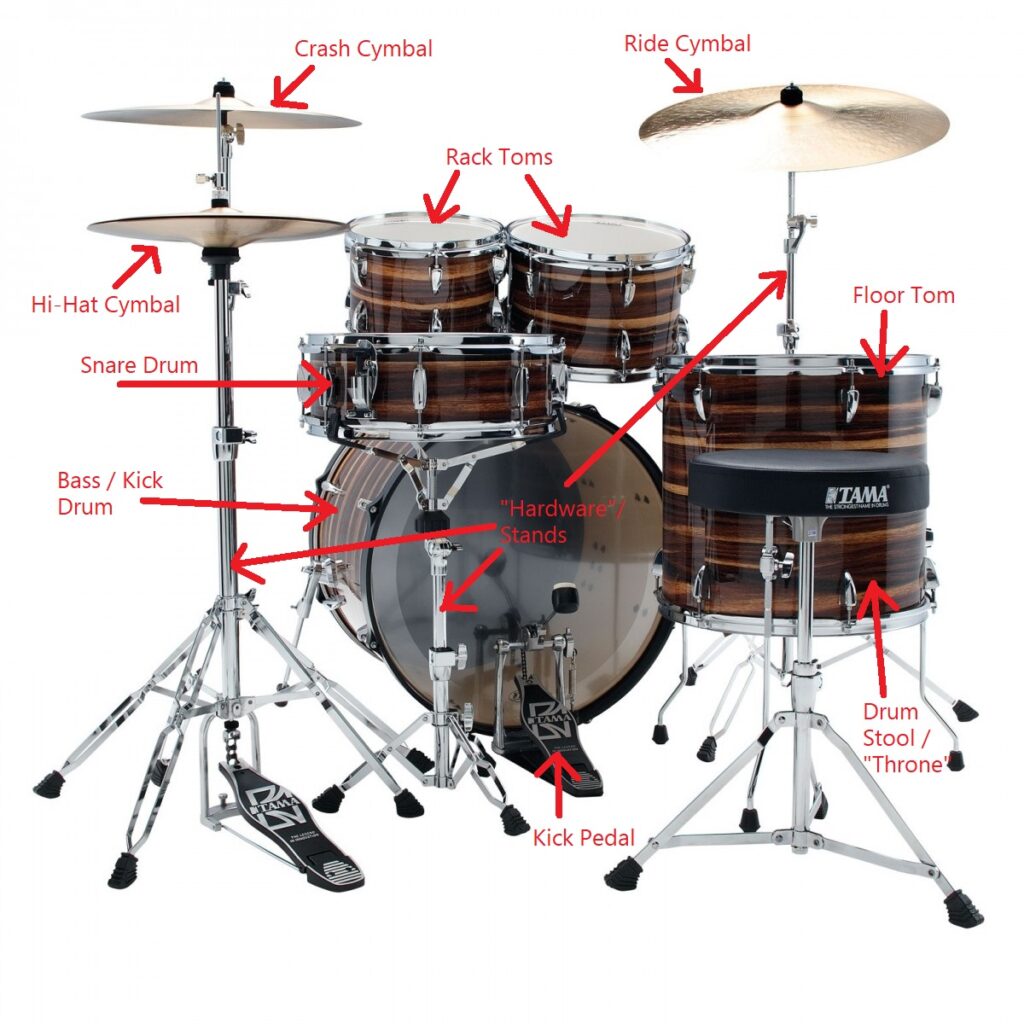
This diagram above shows a typical “5 piece drum kit” – many drum kits are smaller but some are A LOT bigger! This one from Tama is a fairly standard sized good-quality drum kit.
You’ll see from this that a drum kit can be divided into three main components: the drums, the hardware and the cymbals. In essence when you buy a drum kit you are picking the quality of each of these three components.
“So how about starter drum sets at say around £400?”
If you are buying a starter drum kit for a beginner, you’ll see many on the market like the Gretsch Renegade (shown here) or the Mapex Comet amongst many others – that retail typically around the £400 mark. Of course there are some with only three drums which cost less than £100. But what’s not to like about this one? It has cymbals, a drum stool.
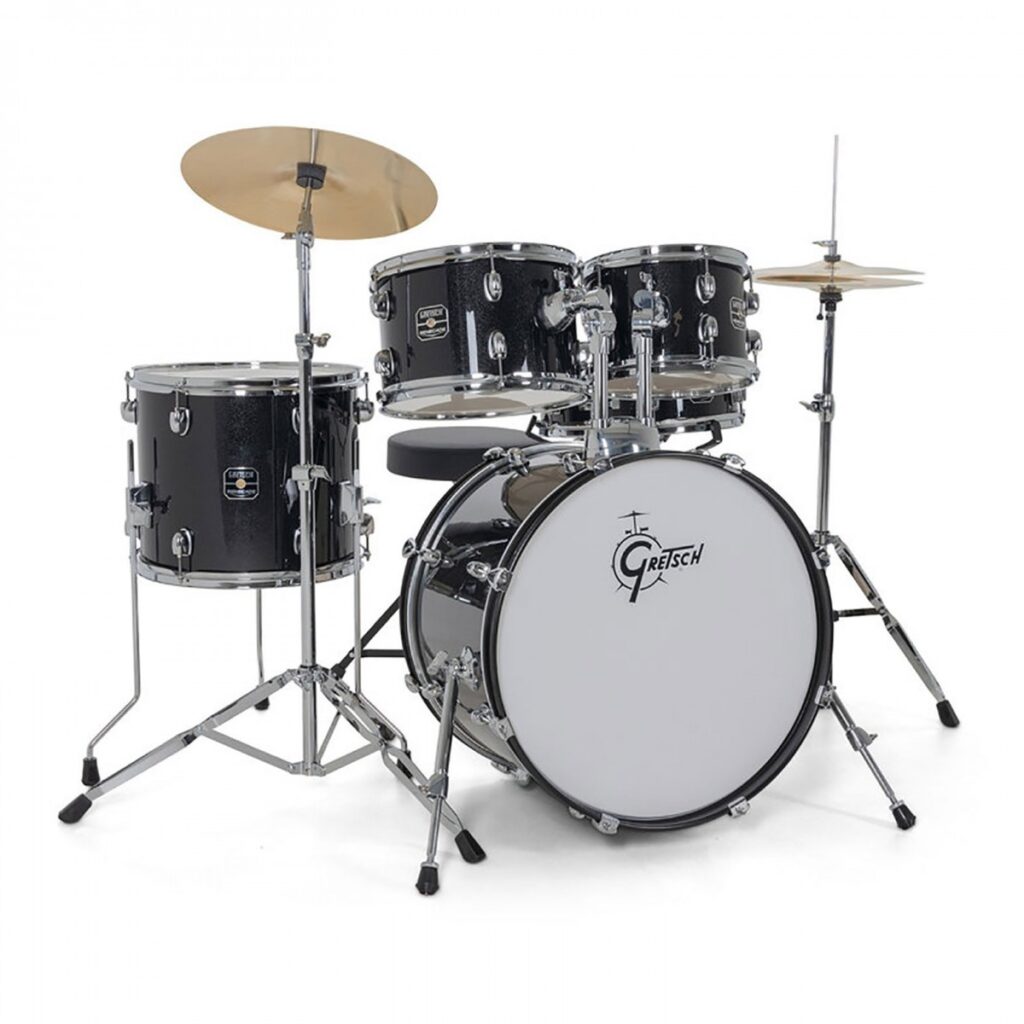
Well that’s true – these kits are great for starting off and will suit many people, especially if you are not sure whether playing the drums is going last a lifetime or be a fad for a few weeks.
But spot the difference between this kit and the one shown at the top…
“The missing cymbal”
Yes you got it! This beginner kit only has two cymbals! It has the hi-hat and it has one other cymbal called a “crash-ride” (but it’s really a crash cymbal). Now fairly soon after starting lessons, your young drummer will need to distinguish between the three cymbals described above, so you might find that only having two is a bit of a problem!
Of course you can add an extra larger cymbal later on, but that may cost £100-£150 pounds for something of decent quality including the extra stand.
So one of the first things you need to decide is if you want to buy a drum kit with the extra cymbal and stand, or start with just the two.
“Even so, how do they do a drum kit for such a great price?”
So, apart from the missing cymbal, how do the manufacturers produce a whole drum kit for around that £400 mark? Well there are certainly compromises along the way. Looking at each of the three components, the drums, the hardware and the cymbals, how do they each fare?
Well the drums themselves are very similar between the manufacturers. If they are reasonably well tuned, then the sound will largely depend on how the the drum heads (or ‘skins’) are – this makes a huge difference. The very cheap drum kits may have very poor quality heads which can sound awful.
The hardware is often basic and lightweight, but certainly workable. The kick pedal again is very basic and might be one of the first things to upgrade, but again perfectly good for a beginner. It’s the cymbals where the compromise is made. The (often 2) cymbals which come with these drum kits are really, really basic – think tin lid! They are often so thin that you can bend them with a hand! Again, they are fine for a complete beginner but they are the certainly a long way from professional standard.
“OK but I’ve just seen a Pearl Drumkit advertised for a bargain price!”
Many people buy drumkits online and see some amazing deals from great brands such as Pearl for a low price. The pictures look normal, where’s the catch?
The answer is – check what you’re buying! Make sure you are buying a complete set with the drums, the hardware and the cymbals. It may be that you are just buying the drums – which is not much use without the rest of the kit, unless you already have hardware and cymbals.
“So what would I get for spending a bit more?”
So suppose you decided you wanted to spend a little bit more and something better quality than those starter kits with the cheap cymbals. What is the next step up?
In our view there is currently one outstanding option for a complete drum kit which gives excellent drums, great hardware and cymbals.
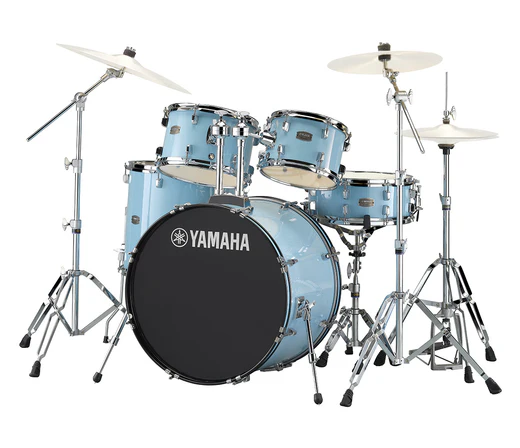
That drumkit is the Yamaha Rydeen kit – it is outstanding value for money and at the time of writing is around the £670 mark including hardware and cymbals.
It has great drum tone, excellent Remo heads, the Paiste 101 cymbals which are far better quality than the cheap starter kit ones, really robust hardware that wouldn’t be out of place at a gig, and a good quality pedal.
Just be aware that the Yamaha Rydeen doesn’t come with a drum stool or drum sticks – you’ll need to get them separately or as part of a bundle. If you get this kit you won’t regret it.
“And up from the Yamaha Rydeen?”
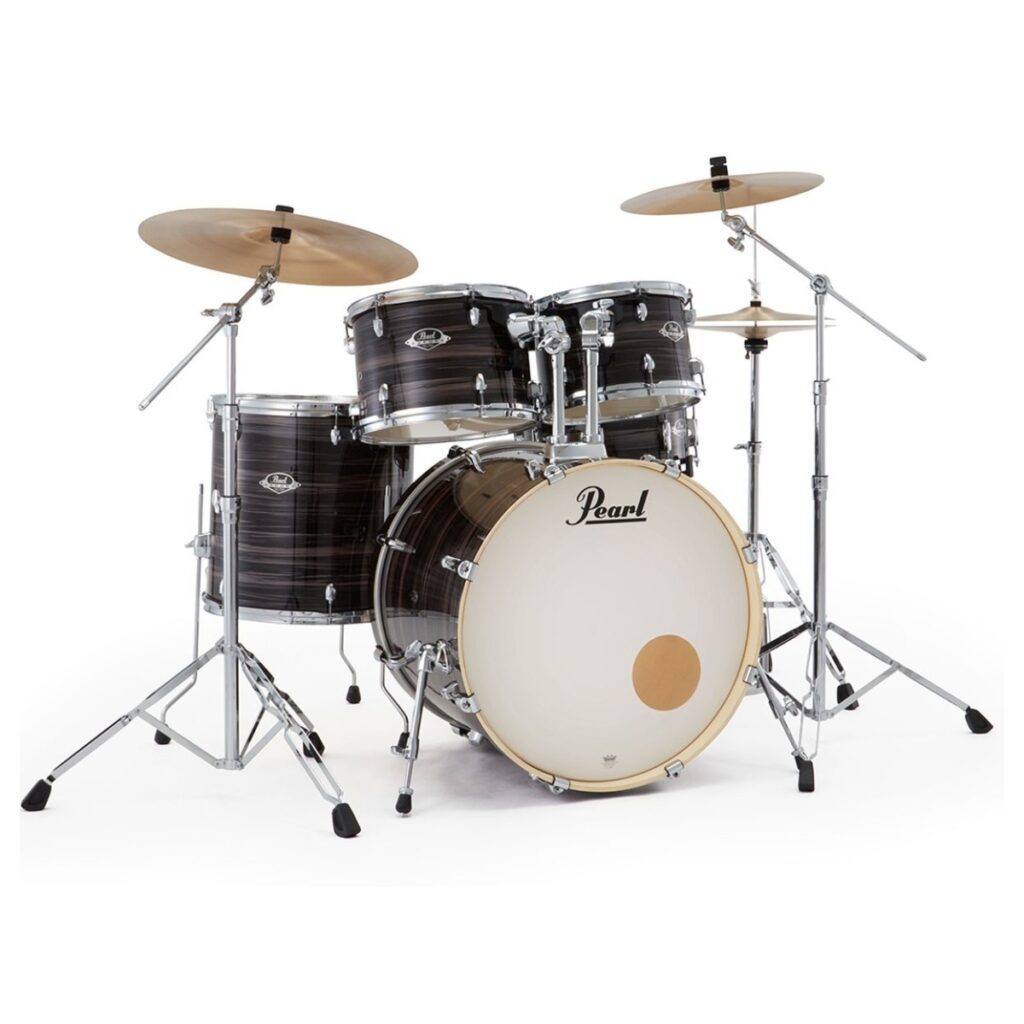
For the next step up, you are starting to get quite a lot of choice, but really for us the clear winner is the Pearl Export drumkit, especially now that it comes with upgraded Sabian PX cymbals, great sound, great hardware, fab looks and deserves its mantel as the most popular drum kit going.
“And what about the size of the drum kit? There are all these options!”
That is an important choice and depends on how big a space you have. Firstly start with the bass drum size – the classic sizes are 20″ and 22″, but smaller 18″ can be fine for home as well. 20″ we would say is safest if you’re not sure. And the toms? With a 20″, that would normally go with 10″, 12″ and 14″ floor tom. This size is often called a “Fusion” size.
If you go for a bigger option and get a 22″ bass drum (classic gigging size) then you can choose to get 10″, 12″ and 16″ floor tom (often call “American Fusion”) or 12″ , 13″ 16″ which is full size or “Rock”.
Any other questions?
Well we hopefully that will be enought to get you started – any other questions call us at 0141 339 4497 or email us at info@drumshopglasgow.co.uk and we will certainly do all we can to help.

